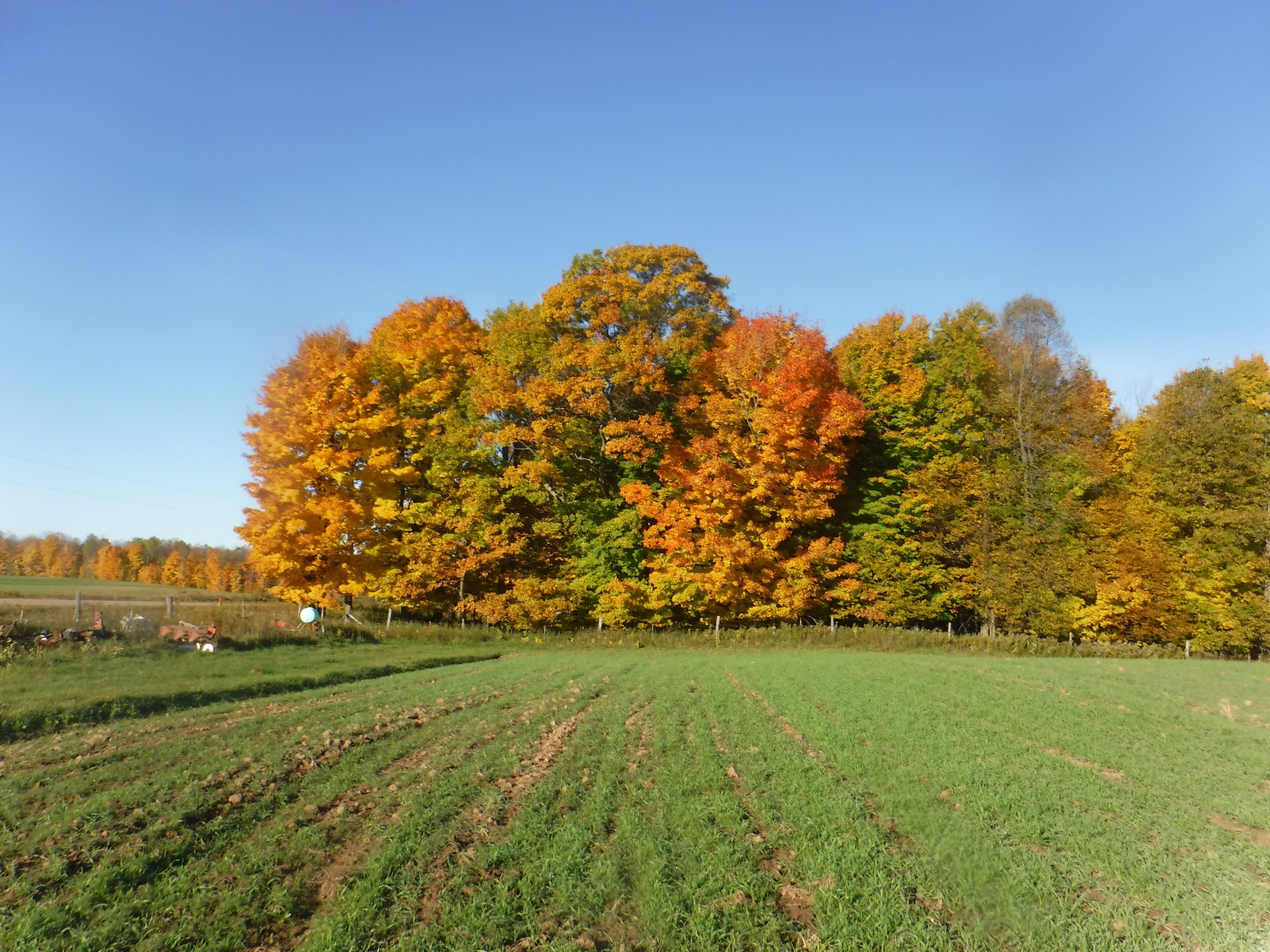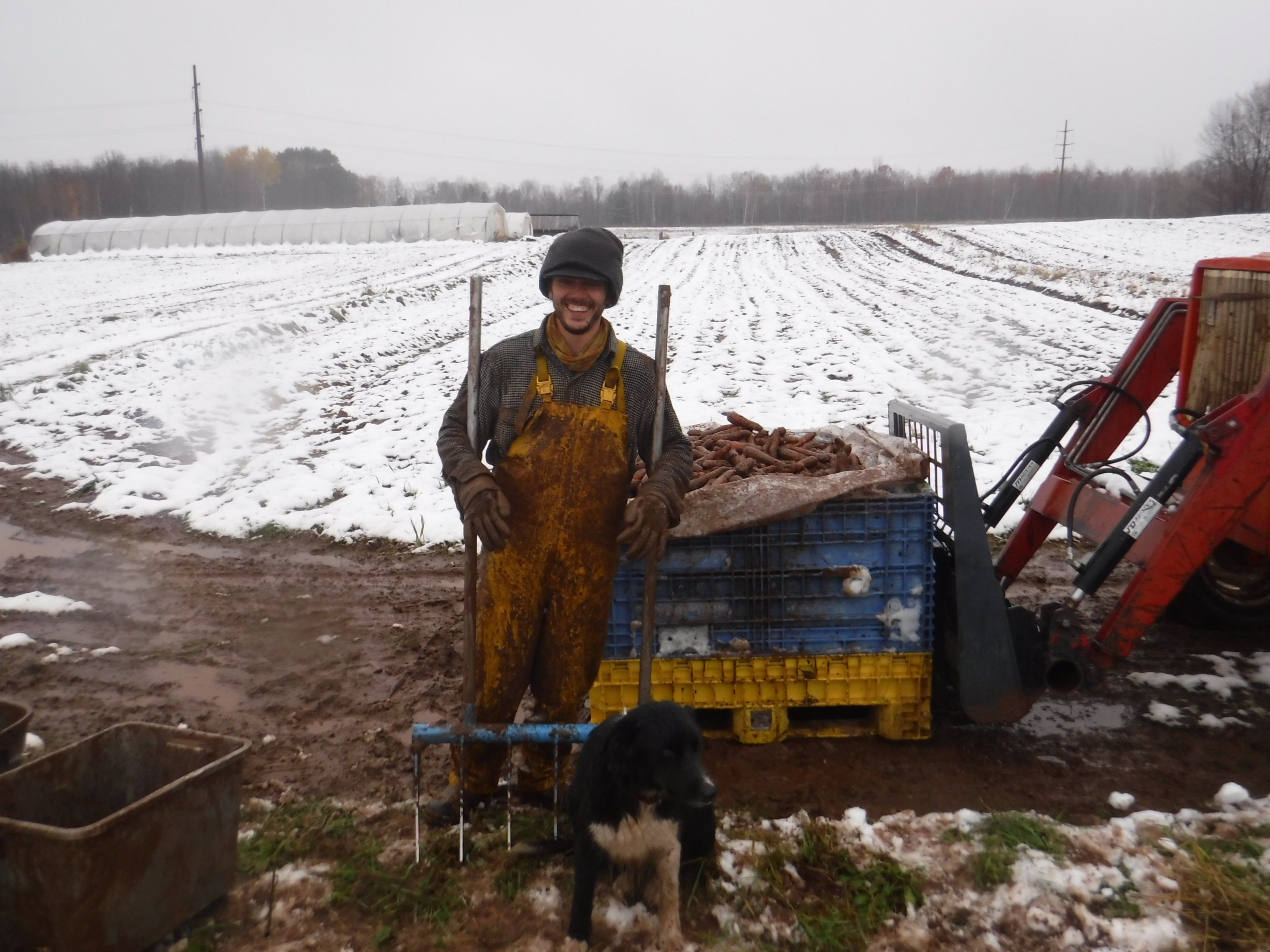The countdown to winter CSA season has begun - only 3 more weeks left!
Remember, every-other week summer CSA boxes end either the week of Oct 21/22 or Oct 28/29, and weekly summer CSA boxes will all end on that last week in October. If you signed up for a winter CSA box, the first delivery will be the first week of November.
Also, please make an effort to return any boxes you might have stockpiled. We appreciate your efforts to return them for reuse!
Last week here on the farm, we tried to soak up as much warmth as we could. This week is a much different story, with highs in the 40's and lows below freezing for at least the next 10 days. October weather has finally caught up with us. Last week, we cleaned out and sanitized the root cellar to get ready for all the winter cabbage, beets, and carrots we have been growing this fall. Yesterday, we got the winter cabbage harvested, loads of beautiful green and even some shiny ruby red cabbage. I know I've said it before, but I'll say it again - this dry fall has been magnificent for minimizing disease pressure on susceptible crops like cabbage. The cabbage looks better than it has in years, and we hope it will keep until St Patrick's Day in March 2021. We doubled down on some great storage cabbage varieties ("Nixon" and "Typhoon") which showed promise in our trials for the last two years, and this year again they did not disappoint! Below you can see farmer Ryan pushing a stack of 2 cabbage bins in the root cellar.
Our little root cellar is a key part of storing produce into winter here. As you can see in the picture above, there isn't much clearance for bins to get through the door, so good tractor loader skills are a must. It's nothing fancy, just a cement block building built into the side of a hill, covered with dirt. A few years ago we upgraded it from a gravel floor to a concrete floor (batch mixed and poured in with a wheelbarrow of course!) so we could move pallet bins around inside easily, and thoroughly clean/sanitize the floor and walls each season to keep spoilage bacteria from building up. It has no electricity or supplemental heat, and is kept warm and cool enough solely by the earth it is built into. But I love these kinds of passive systems. In a power outage, we don't have to worry at all about crops inside there freezing. No fans to break. No electrical shorts to chase down. Just a hole in the ground. A good old-fashioned solution to preserving food.
Last week, we spent a little time chopping the tops off of the brussels sprouts plants, as well as removing the lower 3/4 of the leaves from the stalks. The plants look pretty comical out there now, kind of like short headless palm trees, out of place in the bare, cold, browning landscape, but these management techniques are important to growing brussels sprouts in our short season. Removing the growing tips/tops will encourage the plant to put energy into developing sprouts instead of growing taller. WE know that real, cold winter is rapidly approaching, but the plants, biologically speaking, don't quite realize what they are in for. If left unmanaged, the plants would continue to grow up taller and taller to make a larger stalk for even more sprouts to line instead of putting energy into maturing those delectable sprouts. Unfortunately, up here those additional sprouts would never have time to mature enough to be harvestable, so limiting the top height is critical. Removing the lower leaves helps to encourage air flow to prevent disease - as organic growers, we rely a lot on prevention of disease through management instead of treatment of disease with chemicals. It also makes the sprouts easier to see, so harvesting in cold weather goes faster to keep farmer hands warmer. Cold hands season has officially arrived.
Today we are working on getting the winter beet crop harvested, and next week will begin on the big winter carrot harvest. Some years, winter creeps in slowly and we're able to get all of the carrots out of the ground before the ground freezes. Other years, the cold comes in fast and despite our best efforts some carrots are claimed by the cold, frozen in place. In addition to the fall harvests, we've also been working on building our newest hoophouse. Yes, the one that arrived way back in May... We've been so busy tending crops and harvesting this season that we haven't had a spare minute to even unpack the thing until this week! Tuesday, we started building the arches and sinking the ground posts in with the tractor (pushing them in with the loader as far as we can instead of pounding them the whole 32 inches deep with a mallet) We'll see how far we can get on it this winter, but if the weather cools off too fast it may need to wait till spring to be finished. One more thing on the farm "to-do" list - I have begun to wonder if that list will EVER be "done!"
Years ago, when we started farming we had no tractors. We did everything by hand and by horse, which as you can imagine takes quite a while. Just cultivating this little field of strawberries with our horse Dolly and hoeing out the weeds in the rows was a once-a-week, all-day-long project. There just never seemed to be enough time to get it ALL done (but in all fairness, now that we have tractors I should point out that there are still plenty of loose ends and unfinished projects, so horses are at least not the only culprit.) Anyway, a few years after we got farming, a good friend and farm mentor in our area stopped by to see what we were up to. When he started looking around, I was a little apologetic about all the partially completed projects. The weather makes it difficult to stay focused on one thing for too long, and is in the end our "boss" that determines what NEEDS done (as opposed to what we were working on, or what we'd rather do.) Sustainable, organic farms are by definition dymanic, not nice and clean and linear. When he heard my concern for the loose ends, he looked around, smiled, and nodded approvingly. "Nah, I love seeing all these loose ends," he said. "It means you're staying busy. If you didn't have any loose ends, I'd say ya aren't working hard enough!" Words of wisdom.
Until next week, take good care!
In community -
Farmer Chris
Great Oak Farm






